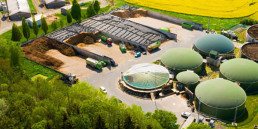Given the amount of biomass and the land consumption, agriculture has a great potential to contribute to the transition to green energy. By exploring integration of innovative technological solutions with economically profitable models this project contributes to meeting the PO2 and the SO2 increased use of green technologies to lower the pollution discharges to the Baltic Sea, not only from the utilization of the fossil fuels but also from the mineral fertilizer.
The total area of agricultural land in the region is 37 Mha with an average fertilizer consumption of 177 kg/ha that could be replaced with the digestate from anaerobic digestion (AD). Integrative solutions will also contribute to circular bio economy and more efficient economy, either by utilization of biomass for e.g. biogas production, or by installation of solar cells. Biogas and solar energy are complementary energy sources since biogas is produced also when the sun is not shining. A decentralized energy system and improved energy storage at farm level will result in increased safety in energy supply and food production, which today are challenges for animal farms. A special challenge is that many farms are not big enough to face the requirements of AD technology, but with the solutions developed in the regular project, farmers will be able to implement new business models based on best practices, exchange knowledge, cooperate and built networks to jointly face environmental, economic and energy supply challenges
Partners:
- Gdansk University of Technology
- AgriFood Lithuania DIH
- Environmental Technology Network Mecklenburg-Vorpommern enviMV
- Rietavas tourism and business information center
- Pomeranian Agricultural Advisory Center
- Lithuanian Food Exporters Association (Litmea)
- University of Rostock


